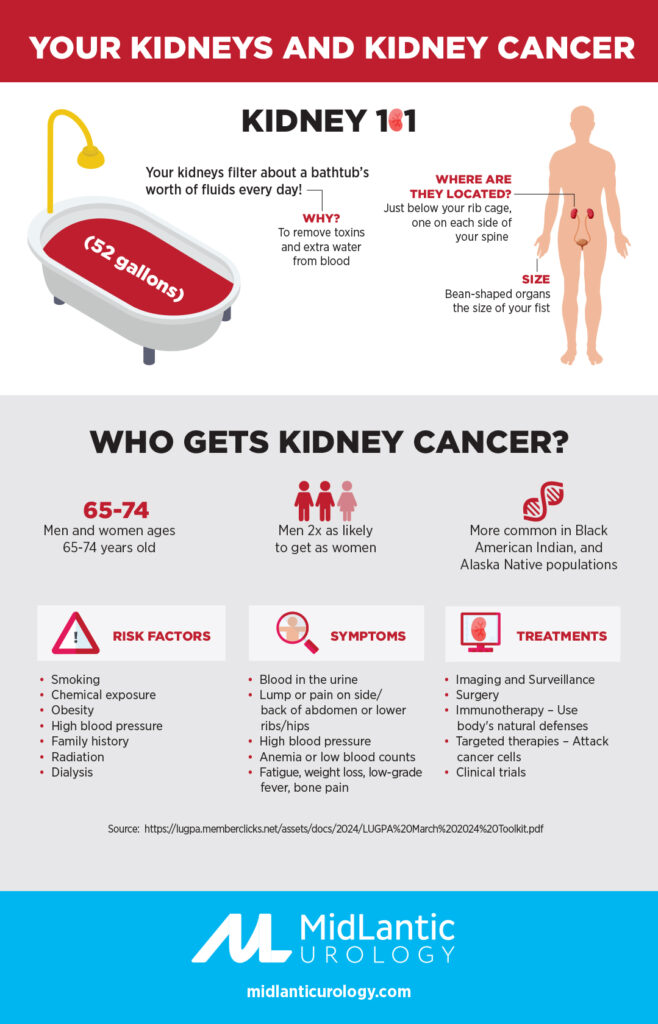MidLantic Urology Is Raising Awareness of Kidney Cancer
March 4, 2024
Philadelphia, March 4, 2024 – During Kidney Cancer Awareness Month in March, MidLantic Urology is working to educate our patients and community members about kidney cancer, which is among the 10 most common cancers in the U.S. for both men and women.
Most people take these two fist-sized organs for granted, but the kidneys are among the hardest working in our bodies. In one day, your kidneys will filter 52 gallons of fluid to remove toxins and extra water from the blood – that’s about a bathtub’s worth.
It is estimated that in 2024, there will be more than 80,000 new cases of kidney cancer, and nearly 15,000 people will die from the disease.
 Symptoms
Symptoms
Most kidney cancers do not cause pain or other symptoms in the early stages, and routine screenings to detect early kidney cancer are not available. However, imaging tests may be recommended for people at high risk for the disease, so discussing personal risk with a urologist or health care provider is crucial.
Most people diagnosed with kidney cancer are between 65-74 years old. Kidney cancer is uncommon for people under the age of 45. Men are twice as likely to have kidney cancer than women, and the disease is more common in Black, American Indian and Alaska Native populations. Additionally, people with a strong family history of kidney cancer are at higher risk, as well as people who have had exposure to certain chemicals, especially trichloroethylene.
Treatments
Treatments for kidney cancer are quickly evolving thanks to powerful new medications and minimally invasive surgery techniques.
Immunotherapy treatments can use the body’s natural defenses to battle cancer, the way our immune system fights off other illnesses. Cancer cells have found a way to trick our immune system into thinking they are normal cells by depositing a unique protein that disguises them. However, powerful new medications attack this protein, remove it, and make the cancer cells again recognizable by our immune system.
Minimally invasive and robotic surgery techniques enable doctors to view the boundaries of cancer cells and save as many healthy kidney cells as possible. This makes partial nephrectomies, which only remove part of a diseased kidney, versus a radical nephrectomy, removal of the entire kidney, more commonplace.
Urologists are part of a kidney cancer care team that supports patients by treating kidney cancer and helping to best preserve kidney function. If someone is diagnosed with kidney cancer, a urologist will typically work as part of a patient’s care team to tailor treatment plans based on each individual patient’s needs. For example, surgery may be the best option for some patients, while others may be best treated with drug therapy or active surveillance.
Prevention
While the treatments being developed for kidney cancer are revolutionary, it’s the tried-and-true approach of a healthy lifestyle and diet that are our best weapons for prevention. The cause of many kidney cancers is unknown, but some risk factors have been identified. Smoking, obesity, high blood pressure, and diabetes, to name a few.
Talk to a urologist to understand risk factors and prevent, diagnose, and treat kidney cancer.
Learn more at MidlanticUrology.com.

